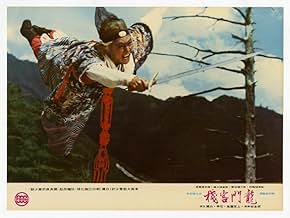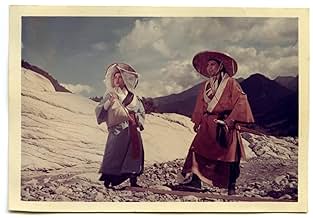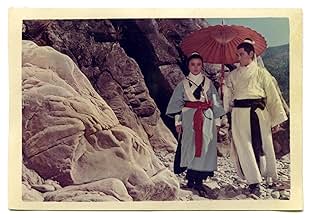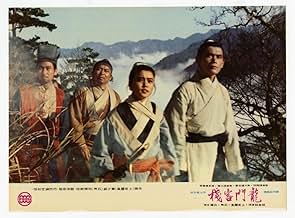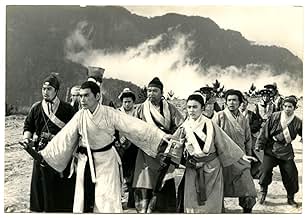NOTE IMDb
7,4/10
4 k
MA NOTE
Lorsque les enfants d'un général exécuté sont pourchassés en 1457 en Chine, d'héroïques experts de l'épée et des arts martiaux interviennent pour les sauver.Lorsque les enfants d'un général exécuté sont pourchassés en 1457 en Chine, d'héroïques experts de l'épée et des arts martiaux interviennent pour les sauver.Lorsque les enfants d'un général exécuté sont pourchassés en 1457 en Chine, d'héroïques experts de l'épée et des arts martiaux interviennent pour les sauver.
- Réalisation
- Scénario
- Casting principal
- Récompenses
- 1 victoire et 1 nomination au total
Avis à la une
This film takes place during the Ming Dynasty with a powerful government official named "Cao" (Bai Ying) in the act of executing one of his main rivals so that he can secure even more power for himself. Having accomplished that, he then orders his elite agents to track down and kill his rival's two children as well. Fortunately, once word of the order is leaked, a small number of soldiers loyal to their previous master take the two children and flee on foot into the desert to escape those in hot pursuit. Upon then being apprised of this development, Cao subsequently orders some of his men to outflank them on horseback to a tavern known as the Dragon Inn. Once there, however, the agents at the Dragon Inn are surprised when a swordsman named "Xiao Shaozi" (Chun Shih) suddenly arrives and creates problems for all of them. Now, rather than reveal any more, I will just say that this is one of those movies which features quite a bit of sword fighting and martial arts--which should please viewers who enjoy action films of this sort. And while I would have preferred a movie with a bit more drama and suspense, I thought it passed the time well enough, and I have rated it accordingly. Slightly above average.
Long considered one of the masterpieces of the wuxia genre King Hu's "Dragon Inn" is a visually superb epic that's closer in tone to Leone than Kurosawa and it features some of the most balletic fight sequences in all of cinema. The plot is virtually irrelevant; there are good guys and there are bad guys and that's really all you need to know while even the comedy works beautifully. The action takes place almost entirely around the inn of the title and the film was further immortalised by Ming-liang Tsai when he chose it to be the film screening in the near empty cinema in "Goodbye, Dragon Inn", (they would make a great double-bill). It's been surpassed in people's affections by King Hu's later "A Touch of Zen" but this is arguably more fun and it established Hu as a force to be reckoned with in international cinema, a genre master as well as a great visual stylist. Wonderful.
10wataru-7
There are some movies that stick by you over the years and this Chinese swords movie from the middle sixties is one of them.
King Hu's Dragon Gate Inn has all the ingredients in it to make this movie a classic. Not only does it have good swords fights and combines these with an excellent story and plot but on a more subtle level the background music adds a really good atmosphere to it that draws you even more into the movie and story.
I can recommend this movie for anyone who is interested in Chinese film in general and anyone who is interested in Chinese swords movies with a good story and plot.
10 out of 10 points from me.
King Hu's Dragon Gate Inn has all the ingredients in it to make this movie a classic. Not only does it have good swords fights and combines these with an excellent story and plot but on a more subtle level the background music adds a really good atmosphere to it that draws you even more into the movie and story.
I can recommend this movie for anyone who is interested in Chinese film in general and anyone who is interested in Chinese swords movies with a good story and plot.
10 out of 10 points from me.
I speculate that King Hu must have left Shaw Brothers with a bad taste in his mouth after doing "Come Drink With Me". "Come Drink with Me" is also one of the greatest martial arts movies despite having room for improvement. This movie feels to me like King Hu made those improvements in it. I consider this his is his masterpiece. I compare it to the movies of Akira Kurosawa. Too bad that King Hu was nowhere near as prolific. This movie could even be considered his one hit wonder.
King Hu seemed to realize the claustrophobic situation of of the good guys and bad guys face to face in the Dragon Inn was great drama but it had to be contrasted with as much wide open space as possible. In "Dragon Inn" most scenes outside the inn are shot in expansive panoramas. Like Kurosawa, King Hu appreciated the way moving the camera brought the audience into the scene. He used tracking shots, particularly during fight sequences, to get this feeling.
Hang Ying-Chieh gets credit as action coordinator. He was the Big Boss in Bruce Lee's "The Big Boss". Remember when Bruce is cut, wipes off his blood then tastes it? Hang Ying-Chieh does the same here. The sword fights are Japanese style - starting with a suspenseful face off, then a sudden attack to cover the distance, just a few quick strokes of action, then stop and wait a few seconds to feel the results. A real sword cut is initially almost painless so the person cut doesn't know until he sees the effect of the cut.
I rate this as one of the best of 1967 and I recommend it to everyone - not just fans of the genre - to everyone.
King Hu seemed to realize the claustrophobic situation of of the good guys and bad guys face to face in the Dragon Inn was great drama but it had to be contrasted with as much wide open space as possible. In "Dragon Inn" most scenes outside the inn are shot in expansive panoramas. Like Kurosawa, King Hu appreciated the way moving the camera brought the audience into the scene. He used tracking shots, particularly during fight sequences, to get this feeling.
Hang Ying-Chieh gets credit as action coordinator. He was the Big Boss in Bruce Lee's "The Big Boss". Remember when Bruce is cut, wipes off his blood then tastes it? Hang Ying-Chieh does the same here. The sword fights are Japanese style - starting with a suspenseful face off, then a sudden attack to cover the distance, just a few quick strokes of action, then stop and wait a few seconds to feel the results. A real sword cut is initially almost painless so the person cut doesn't know until he sees the effect of the cut.
I rate this as one of the best of 1967 and I recommend it to everyone - not just fans of the genre - to everyone.
I saw this film in the 60's, and have yet to find one to beat it. 'Hidden Dragon, Crouching Tiger' has to come in behind this masterpiece. The use of new actors and actresses, the adoption of well-timed traditional Chinese music, e.g. to usher in the villain, the innovative action sequence in sword fights, all added to the brilliance of this film.
Yes, there are shortcomings. Toward the end, and the climax, the anti-gravity leaps to the trees were overdone and unnecessary. Regardless, this film resembles the best of the traditional, addictive Chinese martial art novels that once consumed many hours of the armchair martial art addicts.
Yes, there are shortcomings. Toward the end, and the climax, the anti-gravity leaps to the trees were overdone and unnecessary. Regardless, this film resembles the best of the traditional, addictive Chinese martial art novels that once consumed many hours of the armchair martial art addicts.
Le saviez-vous
- AnecdotesDirector King Hu encouraged his martial arts choreographers to draw from the alternately fluid and rhythmic movements of Chinese opera. Rather than resorting to fast or slow motion, footage printed backward, animation, or other early special-effects techniques, the filmmaker relied as much as possible on the actual skills of his performers and on the magic of editing.
- ConnexionsFeatured in Goodbye, Dragon Inn (2003)
Meilleurs choix
Connectez-vous pour évaluer et suivre la liste de favoris afin de recevoir des recommandations personnalisées
- How long is Dragon Inn?Alimenté par Alexa
Détails
Contribuer à cette page
Suggérer une modification ou ajouter du contenu manquant


